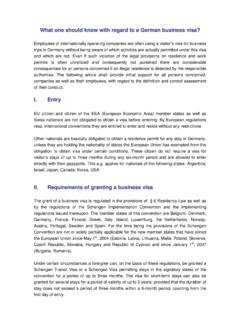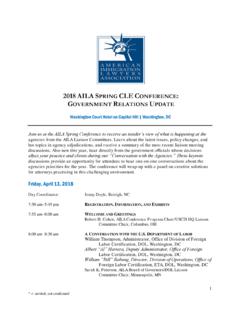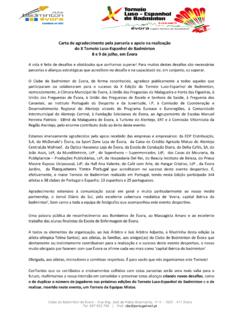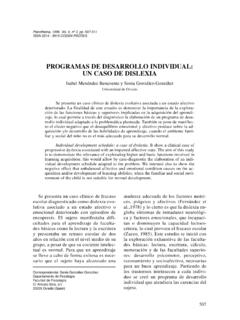Transcription of ANALYSIS OF SELECTED RECENT BALCA …
1 ANALYSIS OF SELECTED RECENT BALCA DECISIONS AS. PRACTICE POINTERS TO AVOID PERM DENIALS. by Cyrus D. Mehta *. The Board of Alien Labor Certification Appeals ( BALCA ) has been incredibly busy issuing a number of decisions. BALCA will be issuing decisions with even greater frequency as it is adding two more panels comprising three administrative law judges each. 1 The current time for BALCA to render a decision is taking about six months, which is a sea change from the RECENT past when the average time for a BALCA appeal was two years or more. It is important for practitioners to stay abreast of these decisions as they offer interesting insights into how to avoid some of the pitfalls in preparing and filing a Program Electronic Review Manage- ment (PERM) application. This advisory highlights some of the RECENT BALCA decisions in the areas of al- ternative requirements, recruitment, roving employees, and errors, which in this author's opinion; provide important practice pointers that would improve the odds for obtaining a PERM approval.
2 2. ALTERNATIVE REQUIREMENTS. BALCA has issued important decisions regarding alternative requirements. As a background, 20 Code of Federal Regulations (CFR) (h) requires that an alternative requirement must be substantially equiva- lent to the primary requirement of the job opportunity. If the alien does not meet the primary job requirement, and while already employed by the sponsoring employer, only meets the alternative requirement, the labor certification will be denied unless the application states that any suitable combination of education, training or experience is acceptable (emphasis added). 20 CFR (h)(4)(ii) essentially adopts the holding of BALCA in Francis Kellogg, 1994-INA-00465, although in that case the primary and alternative require- ments, namely, experience as a cook or salad maker, were not substantially equivalent, thereby necessitating that the employer accept any suitable combination of education, training or experience.
3 In contrast to Kellogg, 20 CFR (h) requires consideration of this language even if there is substantial equivalence between the primary and alternative requirement. Practitioners must therefore be mindful of the magic language, and in addition to its talismanic invoca- tion on the ETA-9089, must also advise the employer to actually consider candidates with any suitable com- bination of education, training or experience in the event that these candidates do not meet the exact require- ments of the position. The current ETA-9089 does not have a special entry for inserting this language, al- though the practice has been to insert it in Box Fortunately, if this language does not appear on the form, it is no longer fatal and practitioners can challenge a denial if the sole reason for the denial was for fail- ure to insert this magic language on the application.
4 In Federal Insurance Co., 2008-PER-00037 ( BALCA . Feb. 20, 2009) the fact that the Kellogg language did not appear on the form could not be a ground for denial Articles do not necessarily reflect the views of the American Immigration Lawyers Association. *. Cyrus D. Mehta, a graduate of Cambridge University and Columbia Law School, is the Managing Member of Cyrus D. Me- hta & Associates, PLLC in New York City. Mr. Mehta is the chair of AILA's National Pro Bono Committee and is also the past co-chair of the AILA-NY Chapter Pro Bono Committee. He is a former chairman of the Board of Trustees of the Ameri- can Immigration Law Foundation (2004 06). He was also the secretary and member of the Executive Committee (2003 07). and the chair of the Committee on Immigration and Nationality Law (2000 03) of the New York City Bar.
5 He is a frequent speaker and writer on various immigration-related issues, and is also an adjunct associate professor of Law at Brooklyn Law School, where he teaches a course entitled Immigration and Work. He received the AILA 2010 President's Commendation for leadership of AILA's pro bono efforts. 1. See AILA Teleconference with Judge Colwell and Todd Smyth at BALCA by Susan Maclean and Josie Gonzales, available on AILA InfoNet at Document No. 10111730 (posted on 11/17/2010). 2. AILA InfoNet has an exhaustive collection of Board of Alien Labor Certification Appeals ( BALCA ) cases under Cases and Decisions, A digest of BALCA cases can also be found on the Department of Labor (DOL) website at 1. 2 13TH ANNUAL AILA NEW YORK CHAPTER IMMIGRATION SYMPOSIUM HANDBOOK. as there is no space on the ETA-9089 form for such language; and the Kellogg language also does not need to appear in recruitment materials.
6 In Federal Insurance BALCA held that a denial would offend fundamental fairness and due process under HealthAmerica, 2006-PER-0001 ( BALCA July 18, 2006). HealthAmerica is a seminal BALCA decision , which rejected the certifying officer's (CO) denial of the labor certification based on a typographical error recording a Sunday advertisement on the form, although the employer possessed ac- tual tear sheets of the advertisement. BALCA rejected the CO's position that no new evidence could be sub- mitted as the advertisement tear sheets were part of the PERM compliance recordkeeping requirement and thus was constructively submitted by the employer. Pursuant to the holding in Kellogg, not every situation requires consideration of the magic language . even when the position has a primary and an alternative requirement, and the alien qualifies only through the alternative requirement.
7 In AGMA Systems LLC, 2009-PER-00132 ( BALCA Aug. 6, 2009), a job requirement of an degree plus three years of experience, and in the alternative, a degree plus five years of ex- perience were substantially equivalent, and thus Kellogg magic language was not required. The employer successfully argued that 20 CFR (h), like Kellogg, requires that when an alternative requirement is substantially equivalent to the primary requirement of the job opportunity, there is no need to consider worker job applicants with a suitable combination of training, education or experience. In AGMA Systems, BALCA held that since an plus three years of experience or a plus five years had the same specific vocational preparation (SVP) or lapsed time to prepare for the occupation (seven years), they were substan- tially equivalent, and were not even primary or alternative requirements, and, thus, the absence of the Kellogg magic language on the application was not fatal.
8 3. The most problematic BALCA case on alternative requirements is its most RECENT , Globalnet Management, 2009-PER-00110 ( BALCA Aug. 6, 2009). In Globalnet Management ( BALCA Aug. 6, 2009), BALCA held that a bachelor's degree plus two years of experience was not substantially equivalent to 14 years of experi- ence. BALCA did not accept the argument that the alternative requirement of 14 years of experience com- ported with the well established formula to determine equivalency under the H-1B visa, three years of experi- ence is equal to one year of education, 4 and held that the primary and alternative requirements were not sub- stantially equivalent. BALCA relied on Field Memorandum No. 48-94 that set forth the years under its SVP. levels for different educational attainments ( , is equal to two years of experience).
9 5 Therefore, the ap- propriate alternative for a position requiring a degree plus two years of experience would have been four years of experience rather than 14 years of experience. While BALCA noted that 8 CFR. (h)(4)(iii)(D)(5) may be persuasive in the absence of other guidance, citing Syscorp International, 1989-INA-00212, it nevertheless relied on Field Memo No. 48-94 in affirming the denial of the labor certifi- cation. This decision is most troubling because BALCA reaffirmed the denial despite the existence of the Kel- logg magic language on the labor certification. 6. The reason why practitioners include such an alternative requirement is to ensure that the requirement is consistent with the H-1B visa petition. It is not unusual to qualify an alien for an H-1B visa who may have the equivalent of a three year degree, and then makes up the fourth year through the equivalent of three years of experience.
10 Will this put into jeopardy ETA-9089 applications that define an equivalent degree, as follows: 3. Beware that not all claims of substantial equivalence between the primary and alternative requirements will be accepted. See Demos Consulting Group, Ltd., 2007-PER-00020 ( BALCA May 16, 2007) (where position's primary requirement was three years experience in the position of Senior Quantitative Analyst/Developer or, alternatively, three years of experience in a posi- tion in software development with distributed multi-tier client server applications. BALCA held that the alternative require- ment was not equivalent to the primary and since alien only qualified under the alternative prong it upheld denial as the appli- cation lacked Kellogg language). While Demos Consulting was decided before Federal Insurance, it is still instructive as it requires the practitioner to take pains to demonstrate that there is equivalence between the primary and alternative requirement.










